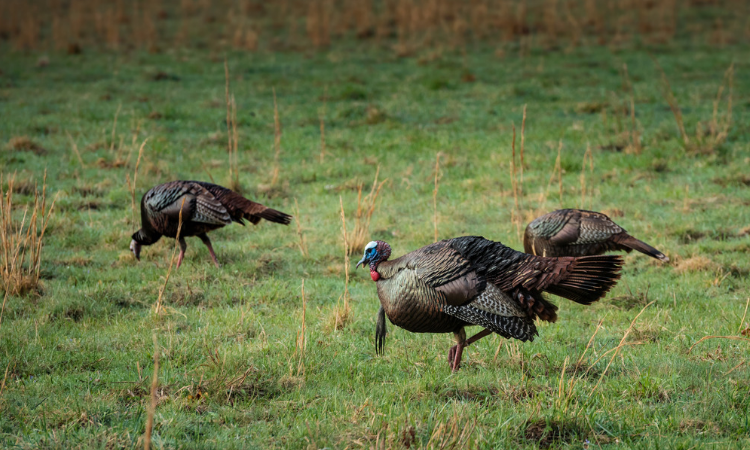
Stock photo of turkeys
Getting under the hood
My son, Byron, and I went turkey hunting a few weeks ago in central Nebraska a couple of miles west of the little town of Wolback (population 257).
It was a guided trip with Gobble and Grunt Outfitters. While by no means cheap, for city slickers like us a guided trip represents the best chance to get one of these gorgeous, tasty critters. And also get a peek under the hood of a rural way of life that we, otherwise, have become almost entirely disconnected from.
Let’s cut to the chase
[wpvideo in6HUVN4]
Might as well get right to it: I got one bird; Byron got skunked. But only because mine was the only bird we saw that we could legally take. Mike, the owner of G&G honored their guarantee and invited Byron back, gratis, later in the season to try again.
Toward the end of the first day, our guide, Nick, set us up in a “double bull” blind about 10 yards away from our three decoys on the edge of an alfalfa field. After the obligatory crow calls to see if we got a quick response from a nearby tom, the three of us climbed into the blind. Where Nick then started using a mouth and slate call to imitate a hen and attract a love struck gobbler.
And sure enough, there came the unmistakable “oble, oble, oble” behind us and to our left. At which point Nick really got after it, yelping, purring and cackling to signify an amorous hen. And a then switching to the frantic gobble of a strutter angry that a rival was muscling in on his harem. As the responses drew closer and closer, time seemed to stand still. Although my heart certainly didn’t. Until, finally, what looked like a gaudy bowling ball appeared no further than 10 feet to our left. Strutting like a little Napoleon, he turned to the right straight in front of us and sashayed forward to challenge our tom decoy. Where he met his Waterloo. See the instant replay above.
Country kitchen
We got back to the “hunting lodge” as the sun sank into a reddening western sky. The home of Mike’s parents when it isn’t being used for guiding, the walls were covered with the heads and racks of huge white tail deer. Side tables displayed monstrous, stuffed gobblers.
Ray, the cook, lives in Wolback. Apologetically, she told me that her grandfather was a “moonshiner” in town back in the ’30’s. And about a tragic night years ago when her dad, and a sizable percentage of the town’s youth, were killed in a car wreck caused by the kids drag racing down the highway.
Of German stock, she’s a firm believer in carb loading. Dinner that night was mashed potatoes and noodles garnished with a smattering of cubed beef and thin, gray gravy. And some very tasty home-grown sweet corn that Mike’s wife raises and freezes. Don’t let me forget the dinner rolls. Or sheet cake dessert. Did I mention the tossed salad sitting next to the Dorthy Lynch dressing?
Roger and his son, Hunter, a couple of good ol’ boys from Arkansas, shared our dinner table. After hearing how their guide had driven nearly 400 miles that day in a monstrous Dodge Ram crew cab to get them three birds, I asked Roger, “what do you guys do?”
“We do baseole.”
“I’m sorry,” I responded, “what did you say? Base hole?”
“No. Base OIL. We reprocess used OIL.”
“Oh.”
The Wicked Witch
After dinner, all 8 or 10 of us went out on the south facing front porch where more big pickups occasionally roared by on Highway 22 before they crested a rise and slowed into Wolbach. Every room in the cabin was wired for radio. Occasionally the country western music and ag reports were interrupted by severe weather warnings about a storm cell boiling up to the west. Coming from our right, lighting brilliantly flashed time and again, making the the branches of the bare, early spring trees in the front yard stand out in stark contrast. And the black clouds overhead swell white.
I looked, but never saw Dorothy’s Wicked Witch of the West riding by on her broom.
Grease. And gumbo.
The heavens opened that night. And reduced the majority of the back roads we used the next day to a vicious combination of grease. And gumbo.
Our guide, Nick, also piloting a huge pickup, was a last minute addition to the guiding crew because two of Mike’s regulars had medical emergencies. Responding to an SOS sent out over Facebook, Nick applied, got the gig, and drove nearly straight through from his usual happy hunting grounds in New Jersey. He only made it to Nebraska a couple of days before the season opened. Which wasn’t enough time to really get the hang of the back roads that ran like rat mazes through this vast, rolling country. Especially when Nick had to keep us on greasy roads and steer clear of ditches and deep ravines with one hand. While holding his cell in the other. And stealing looks at its GPS maps. My seat belt remained buckled, my knuckles were white.
By the end of the day, the mud was caked on so thick I expect you’d have to take a hammer and chisel to it. Before you went to the car wash. But for all that, we never saw a bird we could shoot.
Strange fruit
We came up empty again the next day. But it was at least under sunny skies and roads that were slowly drying out.
That afternoon, Nick set me up in the blind on the edge of a field of cut corn with a line of trees to my back. He and Byron took off on foot to see what they could scare up in a heavily wooded ravine to the west. Just emerging buds shrouded the tree tops in a faint green mist.
Time moved at a different pace. During the three or so hours I sat out there in a folding chair, my shot gun pointed out over the field, maybe four cars went by on the dirt road to my left. Traffic isn’t measure in vehicles per hour. It’s per day. And your average kindergartener could count that high. A squirrel’s repeated “chrrrrrrs” was big news.
Several weeks before, record rain on top of a heavy snow pack had turned usually placid creeks into raging torrents in that part of Nebraska. The evidence was plentiful on the far side of my field that ended at a row of trees before plunging into a stream that, again, was scarcely more than a trickle. Trees from upstream that had been uprooted and swept away were piled up, helter-skelter, against the trees that were still standing. Ten feet up in those branches, and who knows how much farther above the stream bed below, shreds of plastic fluttered in the gentle evening breeze.
As the evening shadows stretched across the field, I heard that “oble, oble, oble” again, to my back and up a woody draw. My heart raced. I strained to get a look. But never saw anything. Byron and Nick walked up to the blind and we packed up.
Time to head home.



